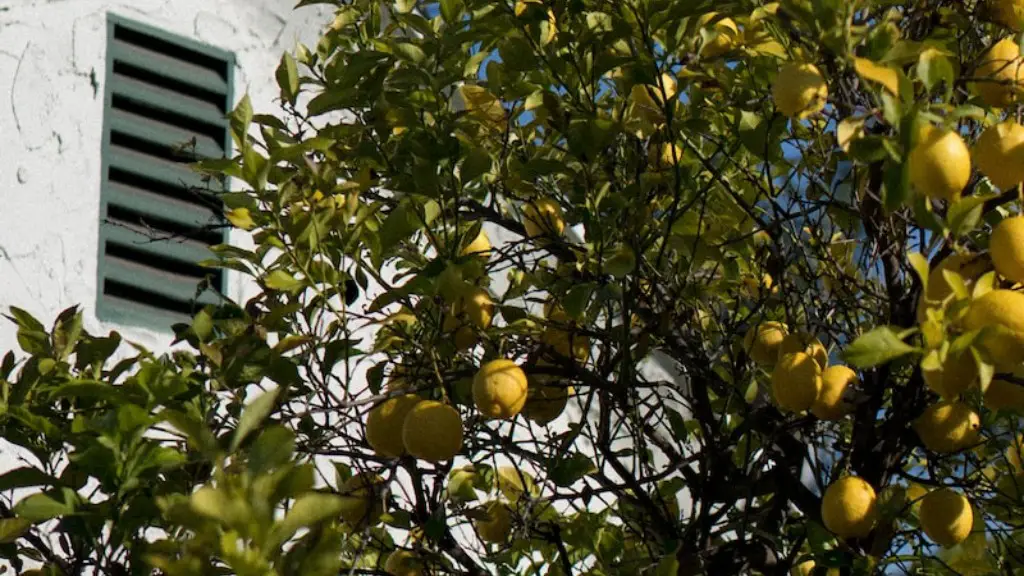Growing a lemon tree on a balcony is a great way to bring life and color to an outdoor space. With the right conditions, and adequate care, balcony growers can achieve a healthy and productive crop of juicy lemons. It is possible to overcome some limitations, such as limited light or windy conditions, with the right preparation and plant selection.
Balcony growers need to choose a variety of lemon tree that can handle the climate and conditions of a balcony. Some varieties, such as Meyer lemons, do better in cooler temperatures, making them a good choice for balconies in cooler climates. Other varieties, such as Eureka lemons, may be better suited for balconies in hot climates. Generally, any variety of lemon tree can be grown in a container, with adequate watering and pruning.
Before planting a lemon tree, it is important to make sure that your balcony space gets enough sunlight to support the growth of the tree. Most lemon trees grow best in conditions with 8-12 hours of direct sunlight per day, though some may require more. When selecting a tree, make sure to purchase one that is suited to the amount of available sunlight. In addition, consider any wind that may reach your balcony. Trees grown in windy conditions should be pruned regularly to reduce the risk of damage to the branches.
After purchasing a tree for your balcony, be sure to read the instructions for planting and caring for it. Lemon trees require regular water and fertilizer to grow, so be sure to provide them with ample water and nutrition. Also, be sure to transplant the tree properly and use a potting medium that drains well, such as a mixture of soil, compost and gravel.
Finally, balcony growers should keep an eye out for potential pests and diseases. Common pests include aphids, mealybugs and scale insects, as well as fungal diseases such as scab or rust. If these pests become a problem, it is important to take action quickly to protect the health of the tree. This may include spraying the tree with an insecticide or fungicide, or removing any infected branches or leaves.
Planting on a Balcony
One of the most important steps when planting a lemon tree on a balcony is proper preparation of the soil. Lemon trees thrive in well-draining, nutrient-rich soils, so it is important to use a high-quality potting mix designed for container gardens. Additionally, be sure to mix in plenty of compost or fertilizer to provide extra nutrition to the growing tree. Before planting, be sure to water the soil thoroughly to ensure even distribution of nutrients throughout the soil.
Once the soil is properly prepared, the tree can be transplanted into its new home. Before planting, prune any dead or damaged branches and ensure that the root system is adequately exposed. Place the tree in the center of the pot and fill with potting mix, while making sure to keep the crown of the tree just above the soil line. Finally, water the soil thoroughly and fertilize the tree according to the instructions given by the manufacturer.
Care for Your Balcony Lemon Tree
Now that the tree is planted, it is up to the grower to demonstrate proper care to ensure that the tree remains healthy and produces fruit. Lemon trees thrive in well-draining, nutrient-rich soils and require regular watering and fertilization. In general, your tree should be watered once a week, and fertilized once a month with a fertilizer formulated for citrus trees. Additionally, it may be necessary to prune the tree from time-to-time to maintain a desired shape or size.
Be sure to monitor the tree regularly and check for signs of pests or diseases. If any signs of pests or diseases are noticed, be sure to take action quickly in order to protect both the tree and fruits. If possible, take steps to naturally control the pests, such as introducing beneficial insects, or using an insecticidal soap spray. Additionally, it may be necessary to remove any infected leaves or branches.
Harvest and Use Your Lemons
Once the tree has been growing for several months, it will enter its fruiting stage. During this time, the tree will produce small fruits that will eventually become ripe, juicy lemons. Be sure to harvest the lemons once they are ripe, in order to prevent them from spoiling. Lemons typically ripen in the summer and early fall, and can be picked when they are firm and yellow in color. After harvesting the lemons, be sure to store them in the refrigerator to keep them from spoiling.
Once harvested, lemons can be used in a variety of recipes, from salads to desserts. Alternatively, you can simply cut a few slices and enjoy a refreshing, tart taste of fresh lemons. Additionally, lemons can be used to make lemonade or tea, or can be used to flavor water or other beverages. The uses are truly endless, and are sure to make your balcony lemon tree a favorite of your household.
Keeping Healthy Conditions
The most important step in caring for a balcony lemon tree is providing the right conditions. Lemon trees require warmth and full sun, and should be kept in temperatures between 65 and 80 degrees Celsius. In addition, the tree should be shielded from strong winds, as this can cause irreparable damage to the tree.
When watering the tree, be sure to give it enough to keep the soil evenly moist, but not too much or the tree will suffer. Additionally, as the tree grows, be sure to check for signs of stress or damage and take action immediately to prevent further harm. This may include pruning back damaged and dead branches, or providing additional fertilizer or water.
Fruit Rot Prevention
When caring for a lemon tree on a balcony, it is important to keep in mind the potential for fruit rot. This is when the fruits are damaged while still on the tree, due to excessive heat or too much moisture in the container. To prevent fruit rot, be sure to water regularly and avoid over-watering. Additionally, remove any damaged fruits and pick the lemons when they are ripe.
It is also important to provide proper drainage for your container. Water should be able to drain out of the container easily, in order to prevent any waterlogged conditions. To ensure proper drainage, be sure to use a potting mix specifically designed for container gardens. Finally, be sure to inspect the fruits of the tree periodically, to spot any potential issues early on.
Pruning Requirements
In order for your lemon tree to remain healthy and bearing fruit, regular pruning is essential. Pruning, or trimming of dead or damaged branches, helps promote new growth and helps keep the tree in a desired shape. Additionally, pruning can help increase air circulation, which helps to reduce the risk of fungal diseases. Prune your tree whenever you start to notice excess growth or damaged branches.
When pruning, be sure to use sharp pruning tools and cut at a 45 degree angle, just above a leaf node. Additionally, avoid pruning too much, as this can damage the tree and reduce the production of fruit. Making the proper pruning cuts promotes new growth, which helps to create a healthier, more productive plant.
Planning for the Future
In order for your balcony lemon tree to remain healthy and productive, it is important to plan for the future. Growing and maintaining a lemon tree requires a significant amount of time and effort, but the rewards are well worth it. Consider what resources you have available and plan to invest the necessary time and energy in maintaining the tree.
Additionally, consider any future changes you may need to make in order to keep the tree healthy. As the tree grows and matures, you may need to purchase a larger container, provide additional fertilizing, or even prune more aggressively. Without proper care and preparation, your balcony lemon tree may not survive or produce the expected level of fruit. Planning ahead can help ensure that you get the most out of your lemon tree.


